Unit 1 Topic 2 The population in developing countries is growing faster. Section D 课件(共25张ppt)
文档属性
| 名称 | Unit 1 Topic 2 The population in developing countries is growing faster. Section D 课件(共25张ppt) | 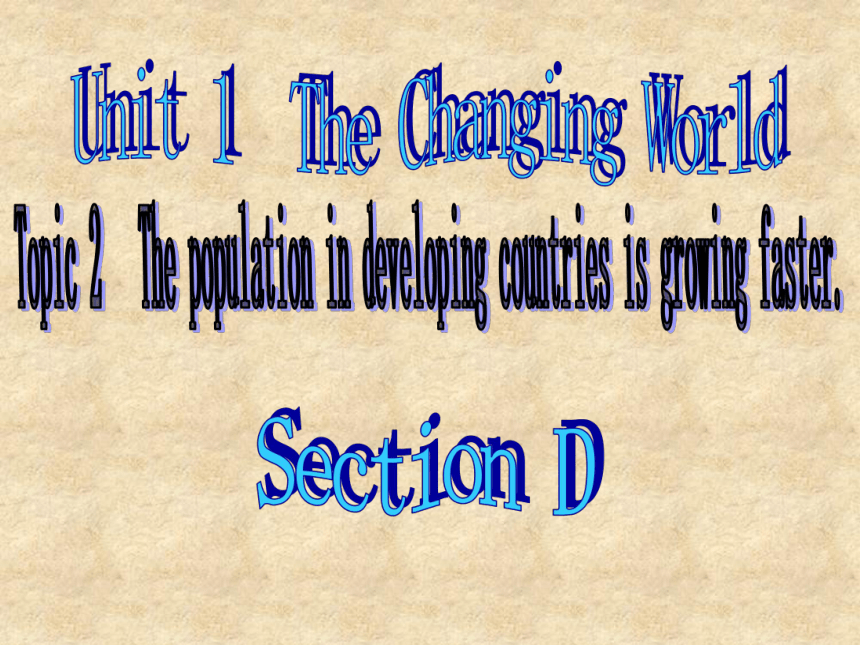 | |
| 格式 | zip | ||
| 文件大小 | 1.5MB | ||
| 资源类型 | 教案 | ||
| 版本资源 | 仁爱科普版 | ||
| 科目 | 英语 | ||
| 更新时间 | 2019-07-19 09:24:37 | ||
图片预览

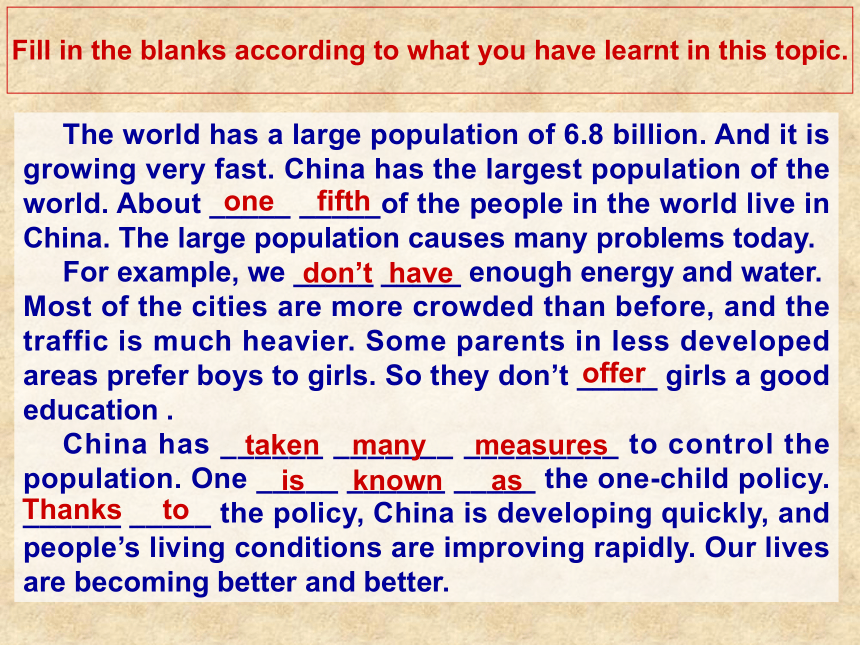
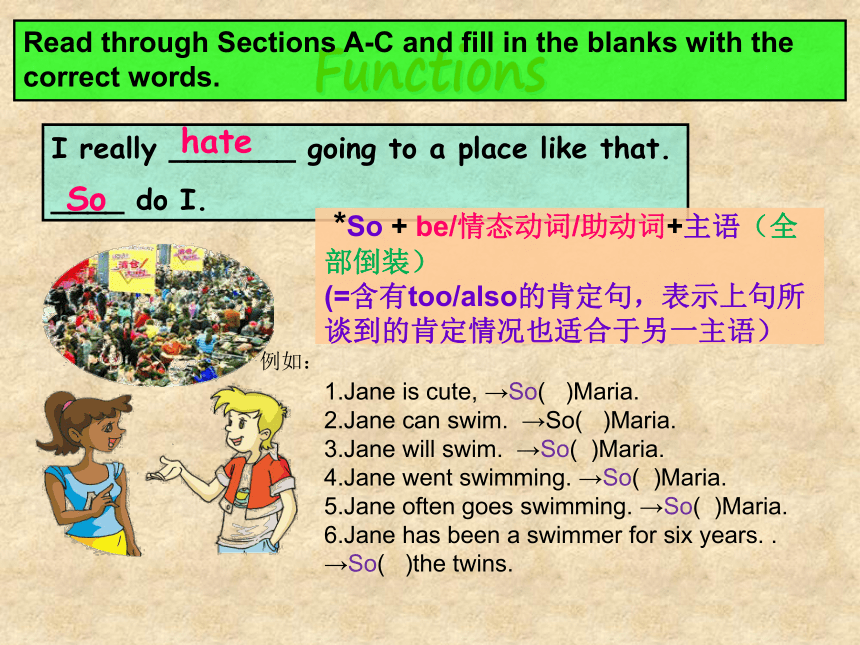
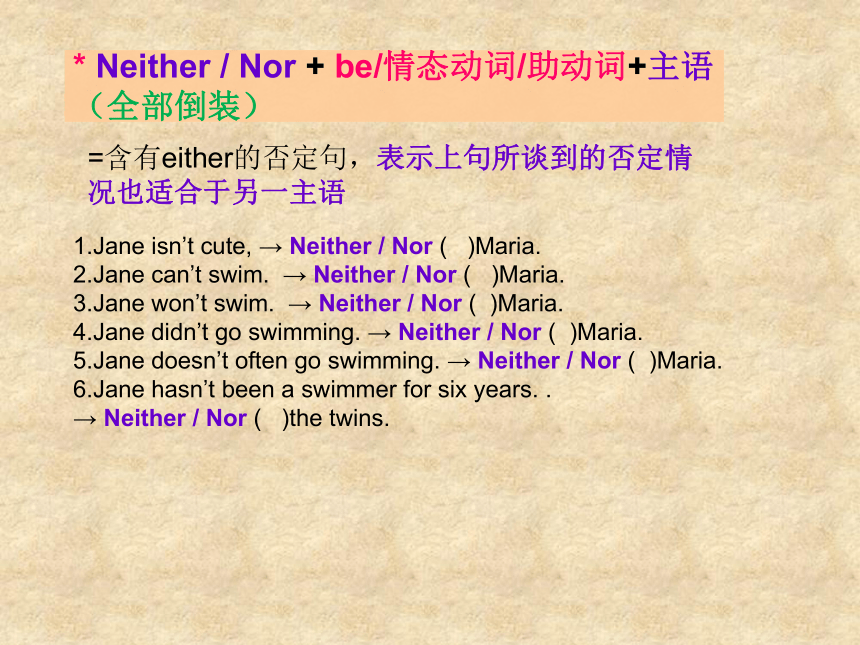

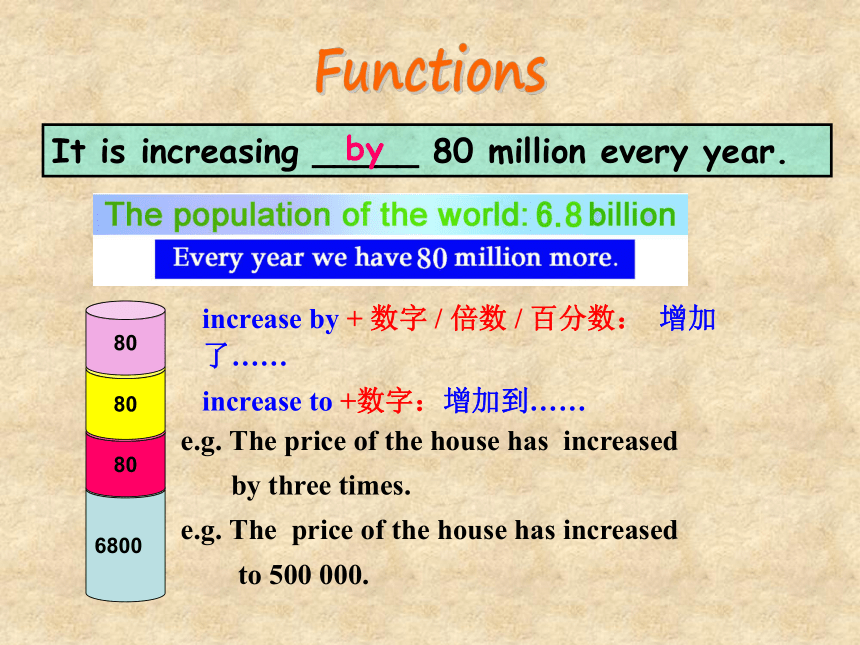
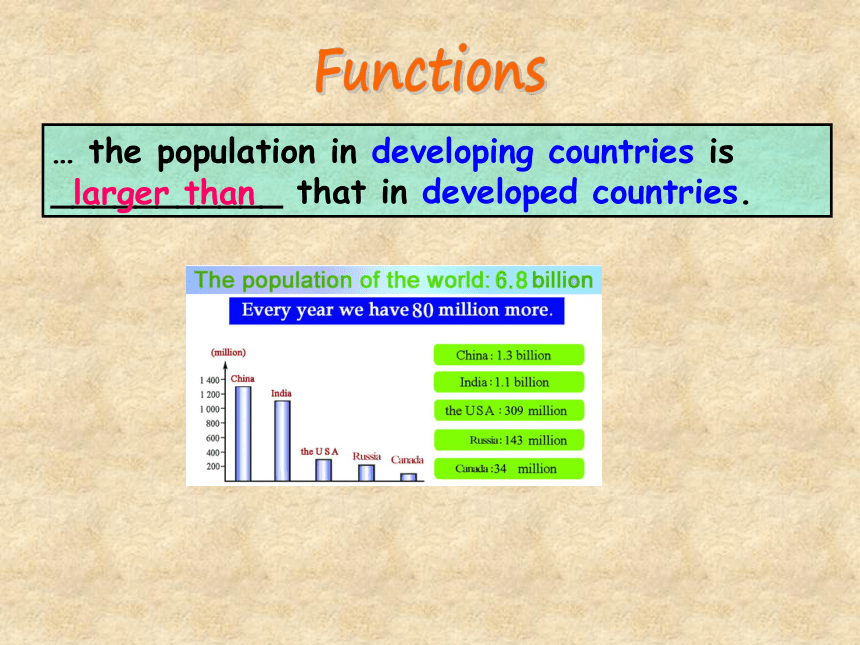
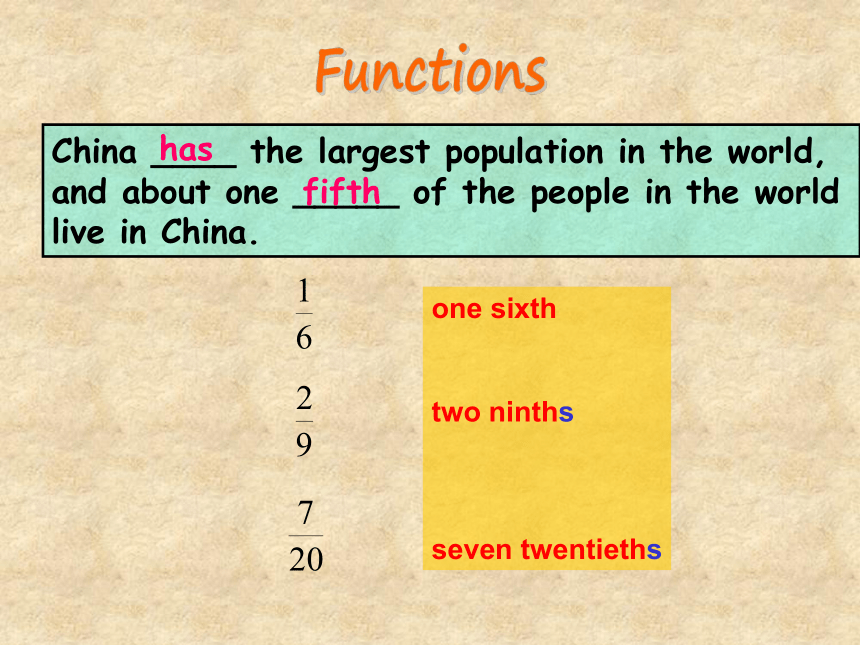
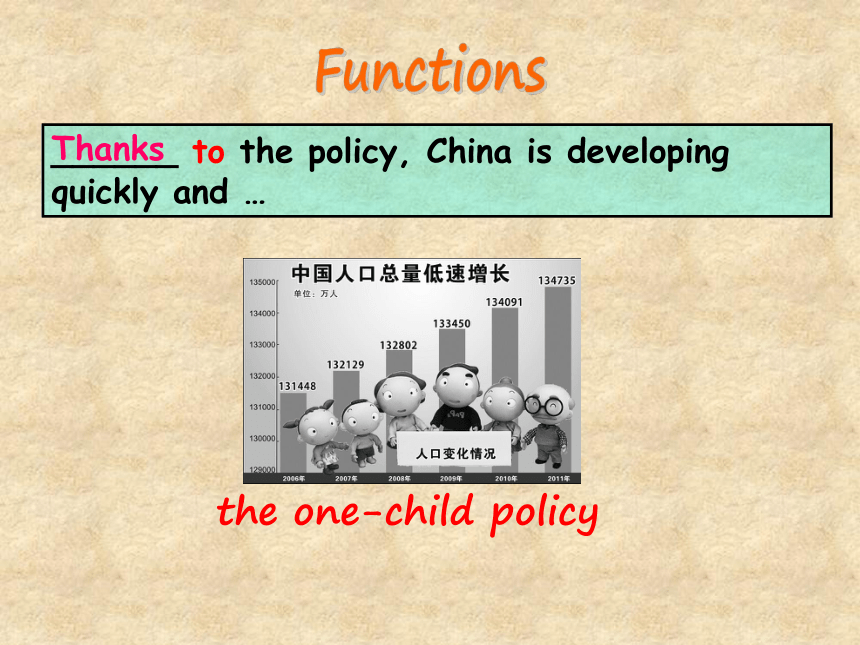
文档简介
课件25张PPT。Section DUnit 1 The Changing WorldTopic 2 The population in developing countries is growing faster.Fill in the blanks according to what you have learnt in this topic. The world has a large population of 6.8 billion. And it is growing very fast. China has the largest population of the world. About _____ _____of the people in the world live in China. The large population causes many problems today.
For example, we _____ _____ enough energy and water. Most of the cities are more crowded than before, and the traffic is much heavier. Some parents in less developed areas prefer boys to girls. So they don’t _____ girls a good education .
China has ______ _______ _________ to control the population. One _____ ______ _____ the one-child policy. ______ _____ the policy, China is developing quickly, and people’s living conditions are improving rapidly. Our lives are becoming better and better.onedon’t haveoffertaken many measuresis known asThanks tofifthFunctionsI really _______ going to a place like that.
____ do I.hateSo *So + be/情态动词/助动词+主语(全部倒装)
(=含有too/also的肯定句,表示上句所谈到的肯定情况也适合于另一主语) Read through Sections A-C and fill in the blanks with the correct words.例如:1.Jane is cute, →So( )Maria.
2.Jane can swim. →So( )Maria.
3.Jane will swim. →So( )Maria.
4.Jane went swimming. →So( )Maria.
5.Jane often goes swimming. →So( )Maria.
6.Jane has been a swimmer for six years. . →So( )the twins.
* Neither / Nor + be/情态动词/助动词+主语(全部倒装)=含有either的否定句,表示上句所谈到的否定情况也适合于另一主语1.Jane isn’t cute, → Neither / Nor ( )Maria.
2.Jane can’t swim. → Neither / Nor ( )Maria.
3.Jane won’t swim. → Neither / Nor ( )Maria.
4.Jane didn’t go swimming. → Neither / Nor ( )Maria.
5.Jane doesn’t often go swimming. → Neither / Nor ( )Maria.
6.Jane hasn’t been a swimmer for six years. .
→ Neither / Nor ( )the twins. *So +主语(上文中主语对应的人称代词)+ be/情态动词/助动词(部分倒装)表示下文对上文的赞成或肯定,译成“的确如此”例如:
1.Tom is good at math. →So he is.
2.Jack can sing well. →So he can.
3.Her mother works hard. →So she does.FunctionsIt is increasing _____ 80 million every year.by6800808080 increase by + 数字 / 倍数 / 百分数: 增加了……
increase to +数字:增加到……e.g. The price of the house has increased
by three times.
e.g. The price of the house has increased
to 500 000.
Functions… the population in developing countries is ___________ that in developed countries.larger thanFunctionsChina ____ the largest population in the world, and about one _____ of the people in the world live in China.hasfifthone sixth
two ninths
seven twentiethsFunctions______ to the policy, China is developing quickly and …Thanksthe one-child policyGrammar FocusThe train (leave).
It (leave) just now.She is doing her homework.
She (not finish)
her homework yet. has leftlefthasn’t finishedA: ______ you ________(care)
for the old before?
B: Yes. We often take part in
social activities.I know the Great Wall very well. Because I (be) there before.Have caredhave beenPresent Perfect (II)Grammarjustneveralreadyyetever have cleaned the clothespastnow表示过去发生的某一动作对现在造成的影响或结果。
e.g. I have just cleaned my clothes. 我刚洗过衣服。
(“洗衣服”是发生在过去的动作,对现在造成的结
果是“衣服干净了”。)
e.g. I have just had my breakfast. 我刚吃过早饭。
(对现在的影响是“不饿”。)cleaned the clothesPresent Perfect (II)常与 just, already, yet, never, ever 等副词连用。Free talkDo you want to live in a small town or a big city?
Why?FairmontBeijingListen and finish the task1. Sue lives in Beijing.
2. Fairmont has a population of fewer than
600 people.
3. The people in Fairmont often see friends
because they live close to each other.
4. There are many fine places to go to
in Beijing.
5. Li Ming doesn’t like Beijing.Read 1 and mark T or F.( )
( )
( )
( )
( )
1 Read the two short passages and take notes based on the table on Page 16.clean and fresh air, close to nature, often help each otherexcellent transportation, fine and interesting places to visithard to see friends, live so far awaylarge population Language points:1.I live in a small town called Fairmont.called Fairmont 是过去分词短语作后置定语,修饰前面的名词town.2.The small town is surrounded by trees.be surrounded by:被… 所环绕(=named=with the name of)3.courage(n.)勇气;encourage(v.)鼓励→encourage sb. to do sth.
discourage(v.)使沮丧,阻挡4.garage(n.)垃圾=rubbish=litter →不可数n.5.What ( ) excellent boy!6.take sb. to +地名:带某人去某地
T or F:He took my grandparents and I to France last year.
Phrase collection给某人打电话 ___________________
lose one’s way ___________________
增加了…… ___________________
developing countries ___________________
developed countries ___________________
carry out ___________________
到目前为止 ___________________
采取措施做某事 ___________________
thanks to sb./sth. ___________________
be surrounded by ___________________
the capital of China ___________________call sb. up迷路increase by发展中国家发达国家实行so fartake measures to do sth.幸亏,由于被……所环绕中国的首都Choose the best answer.
1. —Have you improved your English ______?
—Yes, I have. I’ve ______ improved it.
A. already; already B. already; yet
C. yet; already D. yet; yet
2. China has a______ population.
A. many B. much
C. lot of D. large
3. —Have you been to the village _______ Gum Tree? It’s
a beautiful place.
— Oh, really? I will go there some day.
A. called B. is called
C. calls D. call
4. — I like to sing English songs. What about you?
— ______
A. So I do. B. So do I.
C. Either is OK. D. Neither do I.CDABExercisessummaryWe learn:1. Describe the place I would like to live.
2. Make a report on different type of families.
3. Use the Present Perfect tense.We can:1. Some words:
surround, garbage, discourage, local, capital,
huge, market, transportation, excellent
2. Some phrases:
be surrounded by, close to, the capital of China
3. Some sentences:
Canada is a large country with a population of
about 36 million.ProjectMaking a Report on Different Types of Families1. Look at the different types of families below and
discuss the advantages and disadvantages of each
type of family.
2. Which kind of family do you belong to and which one
do you like better? Why?
3. Report the result to the class.extended familynuclear familyHomework2. Write the composition
in 2.1. Read 1 aloud.3. Finish Section D in
your workbook.4. Preview Section A in
Topic 3.2 Write a short passage about the place you would like to
live based on 1.You may begin like this:
I’m … I would like to live in … First of all, … I’m Maria. I would like to live in a big city, because it is convenient. First of all, it has excellent public transportation so that I can go to any part of the city. Second, it has many places of interest. I, with my friends, can visit these interesting places in our spare time. What’s more, it has many shopping centers and markets. We can buy things easily.One possible version:Thank you.
For example, we _____ _____ enough energy and water. Most of the cities are more crowded than before, and the traffic is much heavier. Some parents in less developed areas prefer boys to girls. So they don’t _____ girls a good education .
China has ______ _______ _________ to control the population. One _____ ______ _____ the one-child policy. ______ _____ the policy, China is developing quickly, and people’s living conditions are improving rapidly. Our lives are becoming better and better.onedon’t haveoffertaken many measuresis known asThanks tofifthFunctionsI really _______ going to a place like that.
____ do I.hateSo *So + be/情态动词/助动词+主语(全部倒装)
(=含有too/also的肯定句,表示上句所谈到的肯定情况也适合于另一主语) Read through Sections A-C and fill in the blanks with the correct words.例如:1.Jane is cute, →So( )Maria.
2.Jane can swim. →So( )Maria.
3.Jane will swim. →So( )Maria.
4.Jane went swimming. →So( )Maria.
5.Jane often goes swimming. →So( )Maria.
6.Jane has been a swimmer for six years. . →So( )the twins.
* Neither / Nor + be/情态动词/助动词+主语(全部倒装)=含有either的否定句,表示上句所谈到的否定情况也适合于另一主语1.Jane isn’t cute, → Neither / Nor ( )Maria.
2.Jane can’t swim. → Neither / Nor ( )Maria.
3.Jane won’t swim. → Neither / Nor ( )Maria.
4.Jane didn’t go swimming. → Neither / Nor ( )Maria.
5.Jane doesn’t often go swimming. → Neither / Nor ( )Maria.
6.Jane hasn’t been a swimmer for six years. .
→ Neither / Nor ( )the twins. *So +主语(上文中主语对应的人称代词)+ be/情态动词/助动词(部分倒装)表示下文对上文的赞成或肯定,译成“的确如此”例如:
1.Tom is good at math. →So he is.
2.Jack can sing well. →So he can.
3.Her mother works hard. →So she does.FunctionsIt is increasing _____ 80 million every year.by6800808080 increase by + 数字 / 倍数 / 百分数: 增加了……
increase to +数字:增加到……e.g. The price of the house has increased
by three times.
e.g. The price of the house has increased
to 500 000.
Functions… the population in developing countries is ___________ that in developed countries.larger thanFunctionsChina ____ the largest population in the world, and about one _____ of the people in the world live in China.hasfifthone sixth
two ninths
seven twentiethsFunctions______ to the policy, China is developing quickly and …Thanksthe one-child policyGrammar FocusThe train (leave).
It (leave) just now.She is doing her homework.
She (not finish)
her homework yet. has leftlefthasn’t finishedA: ______ you ________(care)
for the old before?
B: Yes. We often take part in
social activities.I know the Great Wall very well. Because I (be) there before.Have caredhave beenPresent Perfect (II)Grammarjustneveralreadyyetever have cleaned the clothespastnow表示过去发生的某一动作对现在造成的影响或结果。
e.g. I have just cleaned my clothes. 我刚洗过衣服。
(“洗衣服”是发生在过去的动作,对现在造成的结
果是“衣服干净了”。)
e.g. I have just had my breakfast. 我刚吃过早饭。
(对现在的影响是“不饿”。)cleaned the clothesPresent Perfect (II)常与 just, already, yet, never, ever 等副词连用。Free talkDo you want to live in a small town or a big city?
Why?FairmontBeijingListen and finish the task1. Sue lives in Beijing.
2. Fairmont has a population of fewer than
600 people.
3. The people in Fairmont often see friends
because they live close to each other.
4. There are many fine places to go to
in Beijing.
5. Li Ming doesn’t like Beijing.Read 1 and mark T or F.( )
( )
( )
( )
( )
1 Read the two short passages and take notes based on the table on Page 16.clean and fresh air, close to nature, often help each otherexcellent transportation, fine and interesting places to visithard to see friends, live so far awaylarge population Language points:1.I live in a small town called Fairmont.called Fairmont 是过去分词短语作后置定语,修饰前面的名词town.2.The small town is surrounded by trees.be surrounded by:被… 所环绕(=named=with the name of)3.courage(n.)勇气;encourage(v.)鼓励→encourage sb. to do sth.
discourage(v.)使沮丧,阻挡4.garage(n.)垃圾=rubbish=litter →不可数n.5.What ( ) excellent boy!6.take sb. to +地名:带某人去某地
T or F:He took my grandparents and I to France last year.
Phrase collection给某人打电话 ___________________
lose one’s way ___________________
增加了…… ___________________
developing countries ___________________
developed countries ___________________
carry out ___________________
到目前为止 ___________________
采取措施做某事 ___________________
thanks to sb./sth. ___________________
be surrounded by ___________________
the capital of China ___________________call sb. up迷路increase by发展中国家发达国家实行so fartake measures to do sth.幸亏,由于被……所环绕中国的首都Choose the best answer.
1. —Have you improved your English ______?
—Yes, I have. I’ve ______ improved it.
A. already; already B. already; yet
C. yet; already D. yet; yet
2. China has a______ population.
A. many B. much
C. lot of D. large
3. —Have you been to the village _______ Gum Tree? It’s
a beautiful place.
— Oh, really? I will go there some day.
A. called B. is called
C. calls D. call
4. — I like to sing English songs. What about you?
— ______
A. So I do. B. So do I.
C. Either is OK. D. Neither do I.CDABExercisessummaryWe learn:1. Describe the place I would like to live.
2. Make a report on different type of families.
3. Use the Present Perfect tense.We can:1. Some words:
surround, garbage, discourage, local, capital,
huge, market, transportation, excellent
2. Some phrases:
be surrounded by, close to, the capital of China
3. Some sentences:
Canada is a large country with a population of
about 36 million.ProjectMaking a Report on Different Types of Families1. Look at the different types of families below and
discuss the advantages and disadvantages of each
type of family.
2. Which kind of family do you belong to and which one
do you like better? Why?
3. Report the result to the class.extended familynuclear familyHomework2. Write the composition
in 2.1. Read 1 aloud.3. Finish Section D in
your workbook.4. Preview Section A in
Topic 3.2 Write a short passage about the place you would like to
live based on 1.You may begin like this:
I’m … I would like to live in … First of all, … I’m Maria. I would like to live in a big city, because it is convenient. First of all, it has excellent public transportation so that I can go to any part of the city. Second, it has many places of interest. I, with my friends, can visit these interesting places in our spare time. What’s more, it has many shopping centers and markets. We can buy things easily.One possible version:Thank you.
同课章节目录
- Unit 1 The Changing World
- Topic 1 Our country has developed rapidly.
- Topic 2 The population in developing countries is
- Topic 3 The world has changed for the better.
- Unit 2 Saving the earth.
- Topic 1 Pollution has causes too many problems.
- Topic 2 All these problems are very serious.
- Topic 3 What can we do to protect the environment
- Unit 3 English around the World
- Topic 1 English is widely spoken around the world.
- Topic 2 Some things usually have different meaning
- Topic 3 Could you give us some advice on how to l
- Unit 4 Amazing Science
- Topic 1 When was it invented?
- Topic 2 I'm excited about the things that will be
- Topic 3 China is the third nation that sent a pers
